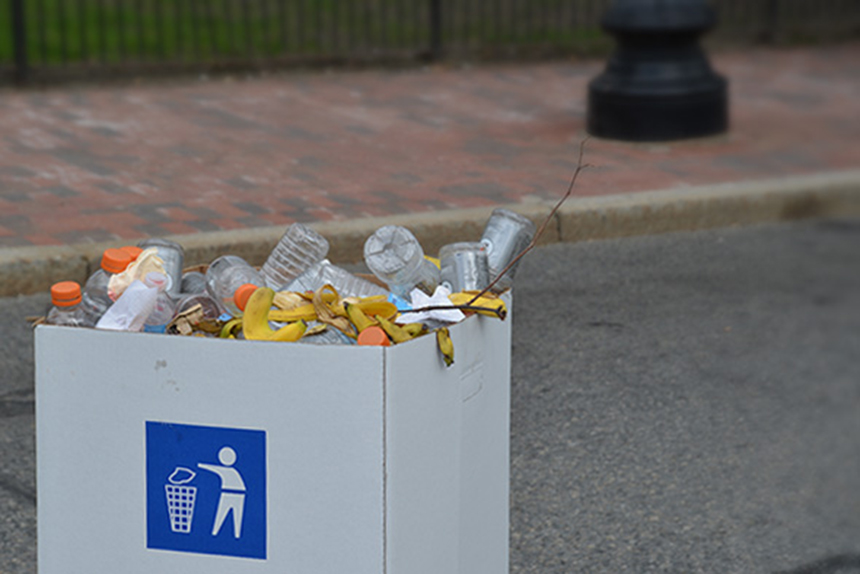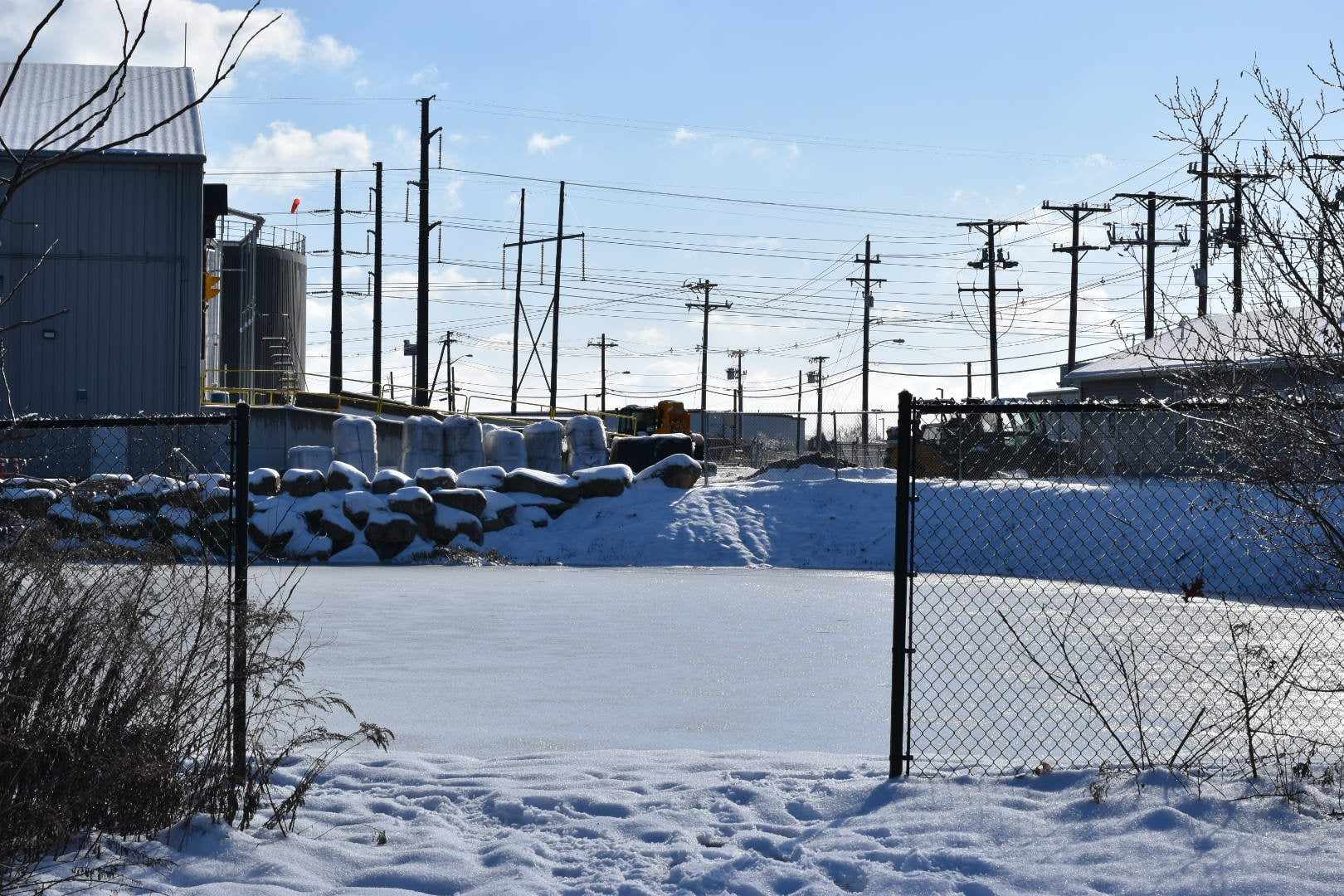Host of R.I.’s State Landfill Does Little to Divert Waste
Johnston has no incentive to recycle
March 5, 2015
JOHNSTON, R.I. — In 2013, the town that hosts the state landfill generated 60 percent more trash than the average similarly sized municipality in Rhode Island. Johnston trucked 1.4 tons of trash per household to the Central Landfill, while the average for municipalities of the same size was 0.85 tons per household, according to a report by the Rhode Island Resource Recovery Corporation (RIRRC), the agency that oversees the state’s landfill and recycling operations.
To solidify its trashy reputation, Johnston also ranked last among municipalities in recycling rate, according to the report. In terms of basic recyclables, such as bottles, cans, paper, cardboard and yogurt containers, Johnston diverted just 12.9 percent of these materials from the landfill in 2013 — 10 percent less than the state average and more than 16 percent less than Warwick, which led among similarly sized municipalities.
Since 1980, Johnston has hosted the Central Landfill. The site, on Shun Pike, manages trash and recyclables from all Rhode Island municipalities except Tiverton, which maintains its own landfill. The Central Landfill is a 230-acre heap of managed, non-hazardous waste and garbage that measures 200 feet from base to plateau.
Not surprisingly, many Johnston residents resent the fact that their town is effectively Rhode Island’s collective garbage can. At a 2004 meeting, prior to the Phase V expansion of the landfill, residents expressed myriad concerns, including the possibility of the landfill contaminating nearby streams and well water, its impact on air quality, the improper disposal of infectious waste and hazardous materials, the pollution of local waterways by the landfill’s seagull population, and the impact of the facility on the property values.
Though the Central Landfill is covered daily to prevent odors from drifting, local residents and nearby communities have regularly complained about the smell wafting into their neighborhoods. In fall 2011, excessive rain and a reduced volume of trash were blamed for strong odors that triggered a rash of complaints.
A smelly deal?
The host community agreement between the town of Johnston and RIRRC is a contract that offers Johnston concessions in exchange for hosting the landfill.
Johnston receives a base payment of $1.8 million annually for hosting the landfill, with the amount increasing 10 percent every five years, according to Kystal Noiseux, RIRRC’s recycling program manager. Additionally, the town receives an annual payment of 3.5 percent of RIRRC’s gross revenue and 1.5 percent of net revenue from the landfill’s gas-to-energy operation.
In all, the town receives more than $3 million annually for hosting the Central Landfill.
These pay-outs don’t disincentivize responsible waste management, but another provision in the host community agreement does. The town of Johnston, unlike the other 37 Rhode Island municipalities that use the Central Landfill, pays no tipping fee on the trash it dumps.
A tipping fee is charged to municipalities and businesses that dump waste at the landfill. It’s a revenue stream for the landfill operator that helps cover the cost of managing the state’s waste. Cities and towns are charged $32 a ton.
Over time, this fee has become artificially low, because Rhode Island lawmakers haven’t raised the cost since 1992 for fear of angering constituents and the waste-hauling industry. At the current fee, for each ton of municipal trash dumped at the landfill, RIRRC loses $11, according to a May 2014 draft of the Rhode Island Comprehensive Solid Waste Management Plan.
Despite this low tipping fee, the $32-per-ton cost still acts as a disincentive for Rhode Island’s towns and cities to send large amounts of waste to the landfill, especially when coupled with the fact that RIRRC accepts recyclables at no charge. This combination incentivizes municipalities to pursue waste-reduction efforts and improve their recycling rates as a way of spending less public money on waste disposal.
Since Johnston pays no tipping fee, it doesn’t experience these incentives. The town would receive no return on investment in the form of reduced tipping costs if it spent public money developing programs to encourage waste reduction. Similarly, it would receive no return on investment if it spent resources on programs to encourage better recycling among residents — whether a plastic bottle is buried or recycled, it makes no financial difference to Johnston.
The town also offers free weekly disposal of its residents’ bulky waste items, thus eliminating any incentive for residents to reduce or find ways to recycle their oversized trash.
In addition to the compensation received from the host community agreement, Johnston also receives $3 from every non-municipal vehicle tipped at the Central Landfill, and 50 percent of the profit-share from out-of-state recyclables, according to Noiseux.
Each Johnston household also is allotted 12 free passes annually to dump up to a ton of trash — the equivalent of 200 120-pound toilets. This policy also doesn’t encourage local residents to reduce or recycle personal waste.
“There is certainly a disincentive to recycle, strictly from a financial standpoint,” Noiseux said.
Communication breakdown
One Johnston resident said she isn’t surprised that the town ranks as one of the worst waste offenders in the state. The woman, who asked to remain anonymous, said she sees how little her neighbors recycle when she walks her dog on collection days.
“Maybe they throw a few cans and a newspaper in the recycling bin, but the trash is always overflowing,” she said. Some people don’t even bring their recycling bin to the curb, she added.
She also said she often has trouble fitting all of her own recyclables into the small bin provided by the town. “We always have more recyclables than trash, and have to try to find ways to fit them in the bin. Everything we buy comes in plastic these days, and nine out of ten times its recyclable.”
She said people regularly put bulky trash such as toilets and furniture on the curb, and the town picks it up for free. She said local officials should better communicate to people about recycling options for bulky items.
A lack of communication from the town about the landfill and recycling is at the heart of her distress. She said local officials rarely provide any information about waste reduction and during political campaigns the issue is rarely discussed. The town’s website offers very little on the topic.
“Why aren’t they communicating with us about how we can help?” she asked.
The woman said she would like to see Johnston remake its image and become known for recycling instead of as “Trash Town.” “I think we are missing a big opportunity,” she said.
No comment
After multiple phone and e-mail requests for comment from ecoRI News, Mayor Joseph Polisena eventually declined to comment about the town’s low recycling rate.
Arnold Vecchione, director of the town’s Department of Public Works, said the likely reason Johnston generates more waste than other municipalities is because of the town’s bulk collection program. Since Johnston pays no tipping fee, the town will accept everything its residents leave on the curb, 52 weeks a year.
“We never refuse anything,” Vecchione said.
He also noted that, because of the way RIRRC calculates the basic recycling rate — total weight of recyclables divided by total weight of recyclables and trash — municipalities that produce more trash overall generally experience a lower recycling rate even if each resident recycles the same amount by weight as residents in cities/towns with higher recycling rates.
Vecchione said the town doesn’t budget for recycling or waste-reduction education, but that it does send out notifications about recycling every three or four years.
The town’s website doesn’t have a page dedicated to waste issues, but does include a link to a RIRRC flyer that tells residents what they can recycle. Until ecoRI News called DPW for this story in February, the flyer was three years out of date, from before Rhode Island transitioned to single-stream recycling.
Among other erroneous information included on the outdated flyer, residents were encouraged to put scrap metal in their curbside recycling bins, despite RIRRC eliminating scrap metal from the state recycling program after transitioning to single-stream recycling.
Putting a price on trash
Trash volumes experience significant reductions in municipalities that charge residents a fee based on how much trash they generate, according to Noiseux.
In North Kingstown, Middletown and Tiverton, for example, trash tons decreased by an average of 36 percent after the towns implemented full pay-as-you-throw (PAYT) systems, where residents pay for all trash they generate, either by weight or by buying special trash bags.
In Central Falls, North Smithfield and Burriville, trash tons decreased by 15 percent after those municipalities switched to partial PAYT systems, where residents pay for the excess trash they generate by the bag, after they’ve surpassed the municipality’s weekly allotment, according to Noiseux.
Unlike Johnston, 24 Rhode Island municipalities charge residents extra for bulky item collection.
Categories
Join the Discussion
View CommentsYour support keeps our reporters on the environmental beat.
Reader support is at the core of our nonprofit news model. Together, we can keep the environment in the headlines.
We use cookies to improve your experience and deliver personalized content. View Cookie Settings



